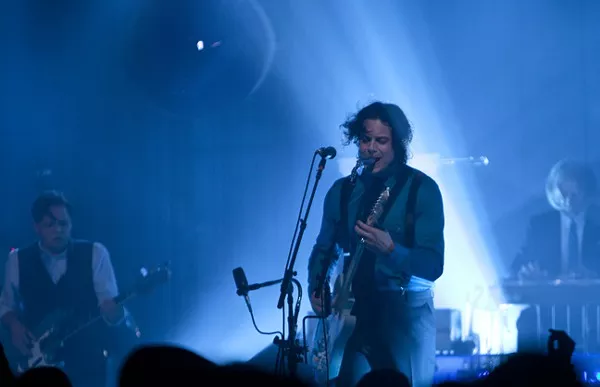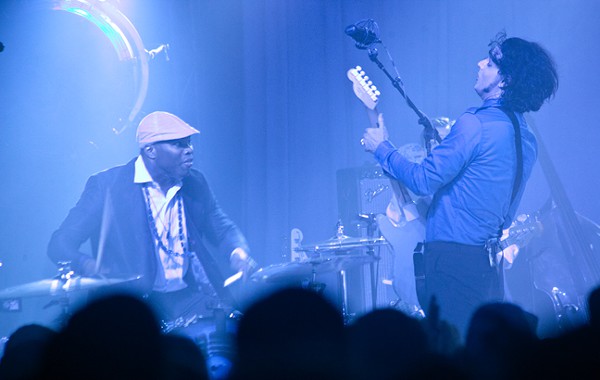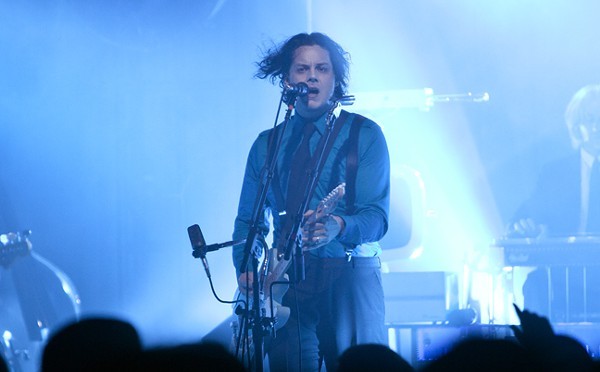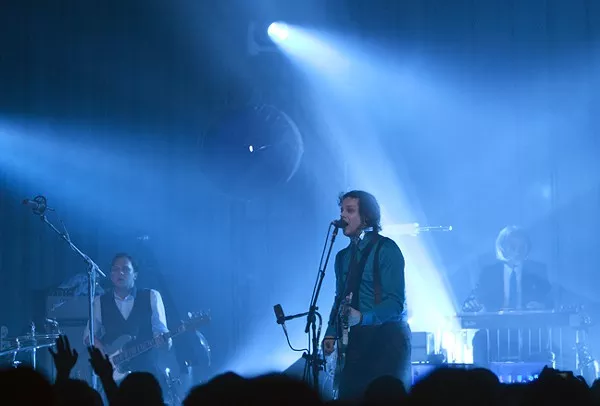Friday, June 6, 2014
Music / Live Reviews Live review: Jack White, The Fillmore (6/5/2014)
Posted By Patrick Wall on Fri, Jun 6, 2014 at 11:31 AM
Jack White
The Fillmore
June 5, 2014

- Photo by Jeff Hahne
- Jack White
For the most famous - and possibly most important - rock 'n' roll star of his generation, Jack White's a bit of a crankypants. Not even his audience is unassailable.
"Some musicians don't care about this stuff, but I let the crowd tell me what to do," White says in a Rolling Stone cover story (which contained a few get-yr-dukes-up nuggets of its own). "There's no setlist. I'm not just saying the same things I said in Cleveland last night. If they can't give me that energy back? Maybe I'm wasting my time." Recall that White drew criticism back in 2012 when he walked off the stage at New York City's Radio City Music Hall, reportedly as a result of a lackadaisical audience. (White reportedly asked at one point during that show: "Jesus Christ, is this an NPR convention?")
If White does indeed feed off his audience, Thursday's sold-out crowd gave him plenty to draw from. (A solid portion of the crowd on the rail showed up not only hours before doors opened, but hours before the box office opened at noon. For a sold out show. One crew of four from Lynchburg, Virginia, camped out overnight to be the first in line and the first on the front row. Directly behind them, a woman who's catching nine dates of this leg of White's tour.)

- Photo by Jeff Hahne
- Jack White
"Y'all are excited," said White's besuited hypeman - all of White's crew, from the sound guys to the guitar techs to the stage hands, wore black suits and fedoras - as he introduced White by way of laying ground rules. (No cell phone cameras. Drink beer. Clap.) That level of excitement for White, though, posed issues for opener Kelley Stoltz, once signed to Sub Pop but now linked with White's Third Man Records cottage industry.
"Our duty," Stoltz deadpanned at the start of his set, "is to warm you up, get you ready for a rock show on a Thursday night. But I think you guys are already pumped." They were, but for White: The crowd politely greeted Stoltz' mostly affable alt-country via Anglophilia, but toward the end, the natives got restless. Not two seconds after Stoltz told the crowd the Charlotte stop was the most fun he'd had on tour with White, a woman shouted for Stoltz to "hurry up." Understandably, it kind of killed his buzz, and Stoltz's band limped through a cover of Cheap Trick's "Surrender" to close its set.
The Fillmore date was part of a tour promoting the brand new Lazaretto, but Jack White's catalog-spanning two-hour set served as a referendum on his entire recorded career. Though he's long since ditched the red-and-black motif for a muted black-and-blue one, a good chunk of the setlist dug into the familiar loamy soil of the White Stripes, eschewing bigger hits (no "Fell In Love With a Girl," for instance, and "Seven Nation Army" was saved for the encore) for more modest ones ("Hotel Yorba"; "Dead Leaves and the Dirty Ground") and deep cuts from the Stripes' earliest cuts.
It's these songs - wiry stomper "Hello, Operator," from 2000's De Stijl, and a roaring take on "Sugar Never Tasted So Good," from 1999's self-titled debut - that benefited best from White's ace backing bad, packing meat onto White's once-skeletal frames. They might have been largely stripped of the amphetamine-addled energy of their recorded takes, when Jack was still calling Meg White's shots, in favor of arena-rock grandeur, but they still packed the grimy punch of White's milieu.

- Photo by Jeff Hahne
- Jack White
White dotted the rest of the set with new jams from the forthcoming Lazaretto - the piano-driven "Three Women" was swampy and grooving; "Temporary Ground" is a hit waiting to happen, and Fats Kaplin's pedal steel playing on the song was absolutely perfect - and a melange of medleys and deep cuts. White's Blunderbuss medley, which worked through "Freedom at 21" and "Sixteen Saltines," worked particularly well, and White even broke out the rare gem "The Rose With the Broken Neck," a leaked cut from his collaboration with Danger Mouse.
But the night's surprise was that White played only a few herculean guitar solos, saving many of his salvos for the night's energetic encore. (Indeed, the encore seemed considerably more fun than the workmanlike main set.) Instead, he let his crackerjack band do the bulk of the heavy lifting, in particular Fats Kaplin, whose pedal steel playing stole the spotlight on several cuts and whose theremin solo in the encore was spectral and haunting. Drummer Daru Jones was particularly on point, especially on the Stripes songs - you could tell he was playing at half-speed, but he worked in enough miniature flourishes to add zest to the otherwise simple plod.
But when White did tee up and take off - as when, late in the encore, he hopped to the stage monitors and unleashed a volley of squealing slide notes during "Seven Nation Army" - the results were electrifying. His playing on the Lazaretto instrumental "High Ball Stepper," in particular, was a highlight, as was the inspired solo break on set opener "Dead Leaves and the Dirty Ground."
If there's a criticism with the setlist, it stems from White's material, which doesn't vary considerably over the course of his career. Presented without context, the Lazaretto songs could be sold as lost B-sides from the De Stijl days, spit-polished and beefed up with studio-grade components. At times, Lazaretto's cuts seemed a bit academic: the title track roars competently, but lacks the snarl of the White Stripes; "Just One Drink," a bluesy battle-of-the-sexes shimmy, is a barn-burning '60s simulacrum, but a simulacrum nonetheless.
Still, the elements that make up his best work are the fundamental building blocks of ur-American rock, and the songs that comprised Thursday's set were among White's best. The result: a loose, almost wholly improvised set that, thanks to the rapport with his players, seemed tightly controlled.
"Jack White is a control freak," wrote the Boston Herald's Jed Gottlieb after seeing White in Boston in 2012. "Yes, he's obsessed with a sound, image and branding devoted to making him look like a mad genius. As he should be, that's what's rock 'n' roll is about."
For one night, at least, I'm on board with that.

- Photo by Jeff Hahne
- Jack White
Setlist
Dead Leaves and the Dirty Ground
Lazaretto
Temporary Ground
You Don't Know What Love Is (You Just Do As You're Told)
Hotel Yorba
Cannon
Top Yourself
Just One Drink
Hello Operator
Sugar Never Tasted So Good
The Rose with the Broken Neck
Weep Themselves to Sleep
Three Women
Hypocritical Kiss
Sixteen Saltines
Freedom at 21
Steady As She Goes
Encore
High Ball Stepper
Missing Pieces
Icky Thump
Seven Nation Army
Goodnight, Irene
Speaking of...
Comments (5)
Showing 1-5 of 5
Latest in The CLog
More by Patrick Wall
-

CD review: Girl Pants' Gloss; Jupiter
Dec 10, 2014 -

CD review: Bo White's Millennial Tombs
Nov 12, 2014 -

Conversations at the 2014 Hopscotch Music Festival
Sep 9, 2014 - More »











